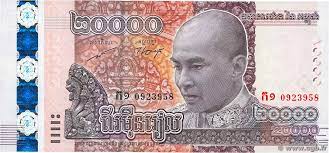ATMs in Cambodia - Can I Use My Australian Debit & Credit Cards in Cambodia?
From ancient temples to marvel at and a vibrant street food scene serving delicious delicacies, Cambodia offers something for everyone to enjoy. You will need spending money to enjoy Cambodia to its fullest, though, and this means possibly having to use an ATM.
At Crown Currency Exchange, we believe you should feel as confident as possible, no matter where you're travelling. So, to take the stress out of dealing with ATMs in Cambodia, we've created this ultimate guide. Below, you'll find information on whether you can use your Australian debit card to withdraw cash, what fees you may have to pay, and more.
Safety and Security Tips for Using ATMs in Cambodia

So, now you know it's best to take cash with you to Cambodia if you want to avoid expensive ATM fees. But life happens, and there may be some instances where you simply need more cash. In this case, there are some important things you should do to make sure you're using an ATM as safely as possible.
Use ATMs in Secure Locations
One of the most important things you can do is inspect your surroundings and only use the ATM if you feel it is in a secure location. Those inside banks or shopping malls are best, and you should also avoid using an ATM at night. Unless absolutely necessary, make cash withdrawals during daylight hours only, as this will increase visibility and reduce the risk of theft.
Stay Alert
In the same way as choosing an ATM in a secure location, take a moment to look for any individual or activity that you feel gives cause for concern. You can always find another ATM if you feel uneasy or notice anything unusual, and it's definitely better to be safe than sorry.
Check for Skimming Devices
Before you insert your card into the ATM, inspect the card reader for any attachments, signs of tampering, or anything else that seems out of place. Some scammers use skimming devices to steal card information, and if you believe the ATM has one of these, do not use it and report it to the local authorities.
Cover the Keypad and Display
When making your cash withdrawal, position your body so you're blocking the keypad as you enter your PIN number. You should also block the screen from view while you're using the ATM, as this will stop anyone from seeing your private account information. Don't be scared, either, to ask for some room if you feel crowded when using the ATM.
Withdraw Only What You Need
Because the ATM fees in Cambodia are pretty expensive, it can be tempting to withdraw more cash than you need in one go, so you're covered for the rest of your trip. However, there is a danger to doing this, as making a large cash withdrawal in a crowded area may attract unwanted attention. As such, it's best to only withdraw what you need.
Keep Your Card and Cash Secure
Once you've completed your transaction, stay at the ATM until you're confident both your cash and card are securely stored on your person. It doesn't matter how big the queue is behind you, take your time.
Monitor Account Activity
In the days following your ATM transaction, keep a close eye on your account and look for any unauthorised or suspicious activity. Any transactions you don't recognise should be reported to your bank who will be able to investigate further.
What Should You Do if Your Card is Lost or Stolen in Cambodia?
No matter how careful you're being, there's still a chance of losing your card when you're travelling, and if this happens, you should contact your bank or credit card provider straight away. There is usually a dedicated number for lost or stolen cards, which you can find on your bank's website, and these tend to have 24/7 operators in place.
In the instance where you think your card has been stolen, the first thing you'll need to do is report this to your bank. They'll advise you on the next steps in their procedure, but this may involve filing a police report. Doing this may seem daunting, but it is often necessary to reimburse any unauthorised transactions, and it can also be used as evidence if someone is arrested for the theft.
Planning Tips for Your Trip to Cambodia

Just like any trip, it's a good idea to plan ahead when you're visiting Cambodia. Doing this means that you can get a much clearer idea of how much cash you should take with you, not just in total but for each day of your trip.
Here are some of our top tips for planning a holiday to Cambodia:
Look Into Visa Requirements
The first stage of your planning is to look at your visa requirements. Australians visiting Cambodia will need a visa, which you can apply for online, and this is valid for 30 days. There are also long-stay visas available, but you'll need to apply through an embassy or consulate of Cambodia to get one of these.
Plan Your Itinerary
Once your visa is in place, start looking at what you'd like to do throughout your stay in Cambodia. Take into account activities, food, accommodation, and transport, and do some research into how much each of these will cost.
Create a Travel Budget
Now you know what you'd like to do and where you plan on staying, you can create a travel budget that is broken down into separate days. With this, you'll know how much to keep on your person each day (with a 10%-20% extra allowance for emergencies), and the rest can be securely locked away in your hotel room's safe.
Vaccinations
It's also a good idea to consult with your healthcare provider and ask about any necessary vaccinations you may need before travelling to Cambodia, including malaria prophylaxis, typhoid, and hepatitis A. While this isn't the most glamorous part of planning your trip, it's incredibly important for your health and general well-being.
Travel Insurance
On a similar note, it's also worth taking out a travel insurance policy before your Cambodian trip. This will cover you for any medical care, as well as lost luggage, cancelled flights, or incorrect accommodation bookings.
Have the Numbers of Your Local Embassy
For things that your travel insurance can't cover, such as lost passports, you should also keep the numbers of The Australian Embassy in Cambodia close to hand.
Get the Best Exchange Rates on Cambodian Riel at Crown Currency
The main takeaway here is that while you can use an Australian debit card or credit card to withdraw cash in Cambodia, doing so will incur quite expensive ATM fees as well as International Transaction Fees charged by your bank.
This is why we always recommend creating a travel budget and exchanging your money before your trip. At Crown Currency Exchange, you'll get the best rates on AUD to KHR with no commission fees or hidden costs. To find out more and speak to our expert team, visit one of our many locations today.
FAQs
Can I Withdraw Money from ATMs in Cambodia?

Let's start by getting the main question out of the way. Yes, you can withdraw money from ATMs in Cambodia using Australian debit cards or credit cards, but there are a couple of stipulations.
Firstly, the card should be part of a major international payment network, such as Visa or Mastercard. While many ATMs in Cambodia accept international cards, including those issued by foreign banks, you're more likely to find success with one of these cards.
Also, while this isn't necessary to make a withdrawal, it's also a good idea to contact your bank or credit card issuer before you travel. Doing this means they're aware of your movements and won't flag any international transactions as suspicious.
Bank-Owned ATMs
Most bank branches in Cambodia, including ACLEDA Bank, Canadia Bank, and Cambodia Public Bank house ATMs and these tend to offer services in both Khmer and English languages, making them easy for tourists to navigate. Also, unlike many bank-owned ATMs, you don't need to be a customer to use these and withdrawals are accepted from a variety of bank accounts.
Foreign-Owned ATMs
There are also ATMs in Cambodia that are owned and operated by foreign banks, and these cater to specific international card networks. Many also offer multi-currency withdrawals, making them ideal if you need to withdraw Australian Dollars instead of Cambodian Riel.
Independent ATMs
As you may have guessed from their name, independent ATMs are not owned or operated by specific banks, but are part of an independent network. While they are usually more conveniently located than other ATMs, the fees are higher, so it's best to avoid these unless absolutely necessary.
Tourist ATMs
In popular tourist destinations like Siem Reap and Phnom Penh, you'll find ATMs that are specifically designed to serve tourists. These offer instructions and services in multiple languages, accept a wider range of international cards and are generally a better choice in busy areas compared to independent ATMs.
What Are the ATM Fees and Charges in Cambodia?

Even though there are specific ATMs for tourist use in Cambodia, no matter which type of ATM you use, you'll still need to pay a fee to make cash withdrawals. On average, this can cost between ៛12,144 - ៛20,240 Cambodian Riel ($4.50 - $7.60 AUD) per transaction. You may also be charged an additional fee by your bank unless you've contacted them before and worked something out.
For this reason, we recommend exchanging your money before you travel to Cambodia and taking it with you. That way, you can avoid these hefty fees, which have the potential to add up to a significant sum over the course of your holiday.
Crown Currency has the best rates on AUD to KHR and you can find out more here.
What Should You Do if Your Card is Lost or Stolen in Cambodia?
No matter how careful you're being, there's still a chance of losing your card when you're travelling, and if this happens, you should contact your bank or credit card provider straight away. There is usually a dedicated number for lost or stolen cards, which you can find on your bank's website, and these tend to have 24/7 operators in place.
In the instance where you think your card has been stolen, the first thing you'll need to do is report this to your bank. They'll advise you on the next steps in their procedure, but this may involve filing a police report. Doing this may seem daunting, but it is often necessary to reimburse any unauthorised transactions, and it can also be used as evidence if someone is arrested for the theft.
Should You Take Cash to Cambodia?

Since ATM fees, exchange rates, and commission fees are pretty high in Cambodia, it is best to take Cambodian Riel with you for your trip. We also recommend keeping your cash with you throughout your journey to ensure it's as secure as possible, and when you arrive at your hotel, use your hotel room's safe to keep it locked away.
However, if you're thinking about taking Australian Dollars to Cambodia and exchanging them when you've arrived, we'd recommend choosing an alternative plan.
This is simply because fees and rates are so high in Cambodia, and you'll end up spending more money by exchanging or making cash withdrawals. Taking Cambodian Riel with you keeps more money in your pocket, which can be used to plan your next great adventure!





.png)
